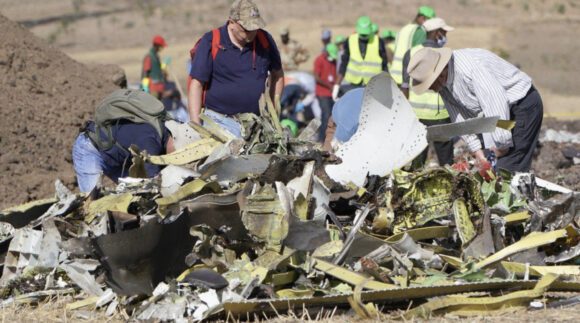
Boeing HQ
Our Daily Boeing will transition into a weekly Boeing report in 2025, in anticipation of 2025 being a smoother and better year for Boeing than 2024. Our coverage will continue to be comprehensive, and summarize the key implications of news stories every Friday afternoon.
This week’s look at Boeing focused on the aftermath of the Jeju Air crash in South Korea, reviews of 2024, and speculation on how the company will perform in 2025. Other news focuses on geo-political and trade issues, particularly with China and airline expectations for improving aircraft deliveries. The week ended with comments from Boeing on its safety progress and comments from the FAA indicating that Boeing needs to put safety ahead of profits and needs a culture change. Finally, the legal situation from the MAX crashes is slowly moving to a resolution.
The Jeju Air crash flight data recorder was damaged, and will be sent to the US for analysis by the NTSB, which has specialized expertise in that regard. Hopefully, the analysis of the last few minutes of the flight will shed more light on the circumstances leading to the belly landing of the aircraft and its subsequent explosion. Jeju air, in the meantime, has cut back on its flight schedule, and the South Korean police have raided both the airline and airport in conjunction with their investigation.
Several stories have speculated on the prospects and potential pitfalls for Boeing in 2025. Boeing’s CEO Kelly Ortberg has a major task ahead of him to change the Boeing culture, and the desired changes cannot happen overnight. But an uneventful 2025 that brings progress with respect to quality and safety would mark a positive step forward for the company in 2025. Boeing certainly doesn’t want another 2024, which started with the Alaska Air door blowout on January 5th that set the negative tone for the year.
International trade will become an issue with the Trump 2.0 administration, in particular, relations with China. Boeing is one of the US companies hit be new Chinese trade controls as the geo-political pressures continue to evolve. While trade policy is a key issue beyond Boeing’s control, the company remains the single largest contributor to the US balance of trade with China, a fact not likely to be ignored by either side. We will need to wait until January 20th to see whether threatened Trump tariffs will be implemented, and the reaction to them.
Ryanair continues to put pressure on Boeing to deliver aircraft, this week with public statements that it expects to receive 29 aircraft from Boeing in 2025. Boeing will need to increase production significantly from 2024 levels to meet its delivery commitments, and has often revised its outlook dynamically through the year, frustrating both customers and its supply chain. Stability in Boeing production in 2025, with actual production matching Boeing projections, would be well received by the industry.
After so many years of Boeing’s stock price being a driving force for corporate decision-making, it was the worst performing stock remaining in the Dow Jones average in 2024. There is speculation that it could either rebound or regress further in 2025. We hope that Boeing focuses clearly on the tasks ahead of it to turn the company irrespective of its market value, knowing that rebuilding the fundamentals will result in the confidence of Wall Street.
Boeing and the FAA appear to have a different view of Boeing’s new safety plan and processes. Boeing touted the progress it has made in safety one year after the door plug blowout, while the FAA head indicated that this is not a one year process, and Boeing needs to change its culture to put safety in front of profits. With the FAA currently limiting Boeing to 38 737s per month and citing a multi-year process and need for cultural change, we would not expect to see that rate limitation removed until much more progress is made.
Finally, the DOJ and Boeing are continuing negotiations to revise the plea deal from the two fatal 737 MAX crashes to address the deficiencies that led to the judge overseeing the case to reject the deal. Increased enforcement capabilities will likely be one result that applies to both the independent monitor and the judge, as deficiencies were noted in the rejected deal. There is also pressure on the DOJ to put some teeth in what many have described as a “sweetheart deal.”
Links to this week’s key stories follow:
- Jeju Air crash black box to be sent to US for analysis, South Korea says – France 24
- Jeju Air to cut flights over safety concerns – Airline Geeks
- Jeju Air offices, Muan airport raided – Taipei Times
- Boeing headlines industrial prospects and pitfalls in 2025 analysis – Seattle Times
- How four missing bolds ruined Boeing’s 2024 flight plan – Washington Post via Toronto Sun
- China hits dozens of U.S. companies with trade controls – NY Times via Seattle Times
- Ryanair to take delivery of 29 aircraft and create 2,000 new jobs in 2025 – Ryanair.com
- Boeing on track to be 2024’s biggest loser in Dow Jones Index – AJOT
- Will Dow Jones index 2024 losers become 2025 gainers? – invezz
- Boeing shares updates on safety plan 1 year after door plug incident – ABC News
- Boeing needs a culture change to put safety above profits, says FAA head – PBS
- Boeing, DOJ in talks to revise plea deal for 737 MAX crashes – Bloomberg Law
Views: 139




